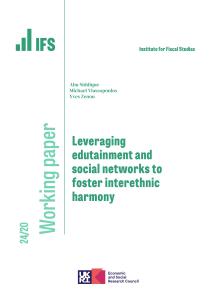<p><p>Each of us is endowed with a unique set of skills that we use in all aspects of our everyday life. Nevertheless, when describing the determinants of socioeconomic outcomes - or even the learning process - we often have a very simplified view of skill. Non-cognitive skills, such as interpersonal skills and selfconfidence, are potentially as important as cognitive skills for labour market success, and for many other aspects of life.</p><p>In this paper, we analyse the determinants and consequences of cognitive skills and one aspect of non-cognitive skills - namely social adjustment - at ages seven and eleven, using data for Great Britain, from the national child development survey (NCDS). We document the importance of these skills for schooling attainment, labour market outcomes and social behaviours at various ages, and analyse the role of families in the formation of these skills.</p><p>We find that social skills are important for a host of outcomes, including schooling, social outcomes such as teenage motherhood and involvement in crime, and also for labour market outcomes. We also find that the early home environment is very important for determining social skills, while social skills also appear to be more malleable than cognitive skills between the ages of seven and eleven, suggesting an important role for policy.</p><p>Our work contributes to a growing body of research that documents the role of non-cognitive skills in an individual's life, all indicating that a uni-dimensional vision of skill is wrong and likely to mislead both research and policy.</p><p>Our work is consistent with a growing body of evidence showing that skills formed relatively early in the life cycle have long-lasting and substantial effects on a variety of important outcomes. It is possible that early human capital interventions, designed to take into account both the multidimensional nature of skills and the dynamic nature of skill formation, can be among the most effective set of policy instruments to combat early school leaving, unemployment, teenage pregnancy, illegal behaviour and many other behaviours and outcomes.</p></p>










